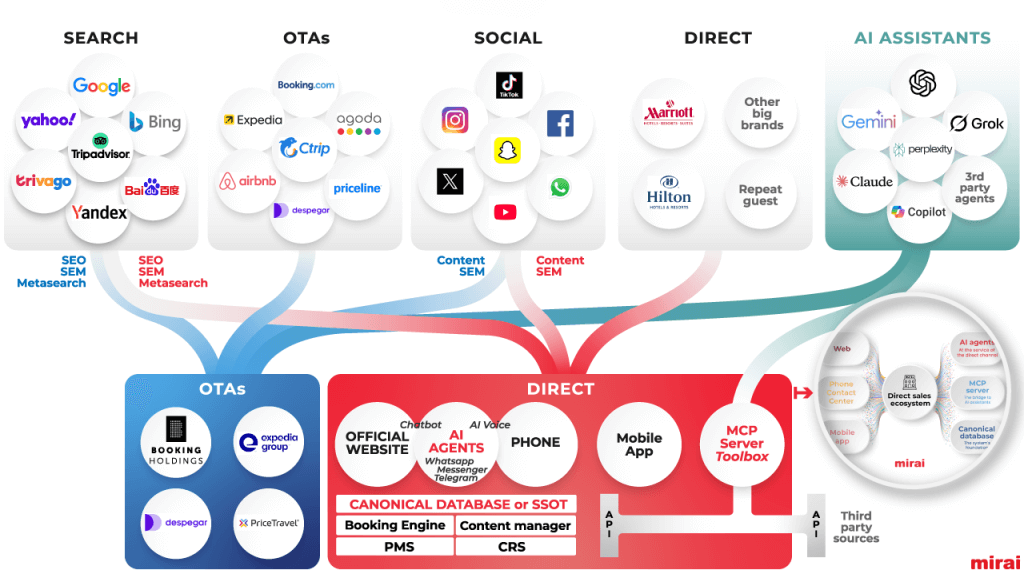The hospitality industry has experienced significant transformations in recent years, particularly in the way hotel bookings are made.
NB: This is an article from Lybra, one of our Expert Partners
Online travel agencies (OTAs) have gained popularity as a primary channel for booking hotel rooms, while direct bookings continue to be a preferred method for many travelers. As a hotelier, understanding the pros and cons of both hotel direct bookings and hotel bookings from OTAs is crucial for developing an effective revenue management strategy.
Subscribe to our weekly newsletter and stay up to date
In this in-depth Lybra Tech blog post, we’ll explore the advantages and disadvantages of each booking method, providing you with insights to optimize your hotel’s revenue potential.
Hotel Direct Bookings
Direct bookings bring many advantages to hoteliers. The following are the main ones:
Better Customer Relationship Management
Direct bookings offer hoteliers the opportunity to establish and maintain direct relationships with their guests. This personal connection enables hoteliers to gain a deeper understanding of their customers’ preferences, which can be used to tailor services and enhance the overall guest experience. Improved guest satisfaction often leads to increased guest loyalty and return visits.
Higher Profit Margins
Direct bookings typically result in higher profit margins, as no commission fees need to be paid to third-party OTAs. This increased revenue can be allocated to enhancing guest experiences or implementing more effective marketing and operational strategies.
Better Control Over Inventory and Rates
Hoteliers have complete control over room inventory and pricing when managing direct bookings. This autonomy allows hotels to optimize their revenue management strategies by implementing dynamic pricing based on demand, seasonality, and other market factors.
Enhanced Brand Visibility
Direct bookings contribute to increased brand visibility since guests are more likely to remember the hotel’s name and website. This brand recognition can lead to repeat business, positive word-of-mouth marketing, and increased customer loyalty.
However direct bookings also bring some drawbacks to hoteliers. Here are the most important ones:
Marketing and Advertising Costs
Driving traffic to a hotel’s website for direct bookings often requires substantial investments in marketing and advertising. These expenses can offset the increased profit margins associated with direct bookings.
Limited Reach
Relying solely on direct bookings may limit a hotel’s reach, particularly when it comes to attracting new or international guests who may not be familiar with the brand. This limitation can impact a hotel’s ability to maximize occupancy and revenue.
Hotel Bookings from OTAs
Online travel agencies are very important business partners for hoteliers and bring many advantages to them. Here are the most important ones:
Increased Exposure
OTAs offer hotels a global platform, significantly increasing their exposure to a wider audience. This visibility can be particularly beneficial for smaller, independent hotels that may lack the resources to invest in extensive marketing campaigns.
Higher Occupancy Rates
Hotel bookings from OTAs can contribute to higher occupancy rates, especially during low-demand periods. Many travelers use OTAs to find last-minute deals or compare prices, making these platforms an effective way to fill empty rooms and generate additional revenue.
Lower Marketing Costs
Collaborating with OTAs can result in lower marketing costs for hotels, as the OTA assumes responsibility for promoting the property on their platform. This cost-saving can be advantageous for hotels with limited marketing budgets.
However the advantages brought to hoteliers by OTAs also have a flip side. More in detail:
Commission Fees
One of the most significant disadvantages of hotel bookings from OTAs is the commission fees, which can range from 10-30% of the total booking value. These fees can considerably impact a hotel’s bottom line, particularly for smaller properties.
Limited Control Over Inventory and Rates
When utilizing OTAs, hoteliers have less control over their inventory and pricing strategies. This limitation can make it challenging to optimize revenue management efforts effectively and respond to market fluctuations in real-time.
Potential for Brand Dilution
OTAs often prioritize their branding over individual hotel properties. As a result, hotel bookings from OTAs may not contribute significantly tothe hotel’s brand recognition or customer loyalty. Guests may associate their stay more with the OTA than the hotel itself, making it harder for hotels to build a strong brand identity and retain customers.
Customer Relationship Challenges
When guests book through OTAs, hoteliers may not have immediate access to their contact information or preferences, making it more difficult to personalize their experience. Additionally, any communication between the guest and the hotel often goes through the OTA, which can create a barrier in establishing a direct relationship with the guest.
OTAs vs Hotel Direct Bookings: The Bottom Line
Both hotel direct bookings and hotel bookings from OTAs offer unique advantages and disadvantages for hoteliers. To optimize your revenue management strategy and overall hotel performance, it’s essential to find a balance between the two booking methods.
Utilizing the global exposure provided by OTAs can help attract new guests and fill rooms during low-demand periods. At the same time, fostering direct relationships with your guests through direct bookings can lead to increased customer loyalty, higher profit margins, and better control over your inventory and pricing strategies.
A well-rounded approach that combines the strengths of both direct bookings and OTAs will help hoteliers maximize their revenue potential and provide an enhanced guest experience. By continuously analyzing the performance of both channels and adjusting your strategies accordingly, you can achieve long-term success in the competitive hospitality industry.





